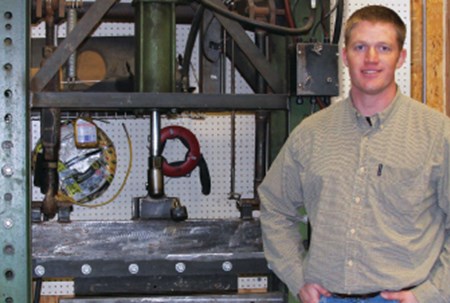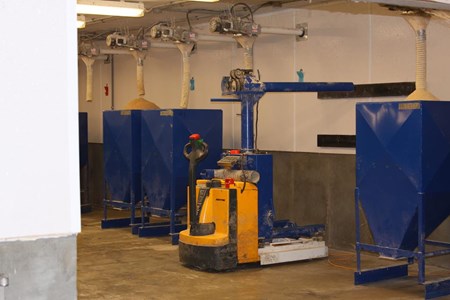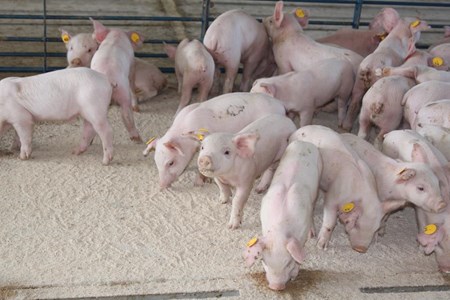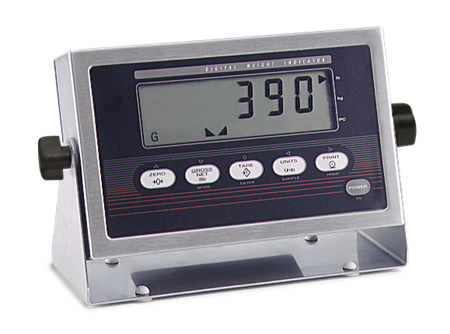Is the website displaying in the correct language? Please confirm or select a different language.
Your region has been set automatically. Please confirm or select a different region.
In Search of the Perfect Pig
Weight counts, but manners matter. OEM Mosdal Scale builds custom equipment for modern agricultural applications.
Custom Equipment for Agricultural Operations
Modern agricultural operations that raise livestock for food and animal products must have precision weighing equipment to measure and promote optimal animal wellbeing from start to finish. Mosdal Scale Systems Inc., in Broadview, Montana, has been manufacturing custom-designed feeding and weighing equipment since 1976 and they have been a Rice Lake customer for more than two decades.
At the heart of Mosdal Scale's success stands Grace Mosdal, Thelmer's wife, business partner, sales director, public relations director, office manager, and baker of cinnamon buns. She smiles to remember all the scale systems that were designed at their big round kitchen table. "We designed a hanging scale to weigh penguins in Antarctica for a University of California research project," she recalls while serving coffee and homemade cinnamon buns.
Thelmer Mosdal was in the hog business when he built his own feed cart because nothing was available that met his standards. Then he built one for his neighbor (still in working condition three decades later). Soon Thelmer sold the hogs to concentrate on feed carts. Toward that goal, he built his own metal shear, ironworker, hydraulic leaf brake, pipe bender, roller, band saw, and press brake (still in working condition).
After growing up working with his grandfather in the shop, Jarred Mosdal, a mechanical engineer, has taken over the business. "Today our feed systems are being used in China, Holland, England, Brazil, Australia, Mexico, Canada, and at least 40 different states.
"One of our feed systems saved a big food processor a million dollars compared to a competing system. A research facility in Iowa figures with our equipment, they can cut costs by 25¢ per hog per year; saving more than enough to support their entire research farm.
"In the beginning we used the Rice Lake 310 indicator that ran on a special battery. Our indicator of choice today is the IQ plus® 390-DC. Customers love it. It runs on standard C batteries. The stainless steel enclosure can be washed down. It has a big display that is easy to see in a dusty, dark barn. And the three-stage digital filtering feature (RATTLETRAP®) and LiveWeigh® option gives you an accurate weight even if there is vibration or animal motion."
To see some Mosdal equipment in use, we visited two swine research facilities in Lafayette, Indiana-at Purdue University Department of Animal Sciences, where swine nutrition trials are run, and at the Hickory Ridge Research & Consulting facility, where swine pharmaceutical trials are conducted for a private company
The Science of Sniff
Purdue University Department of Animal Sciences' mission is to educate students and to research efficient and sustainable production of animal products that optimizes animal wellbeing and promotes sound environmental practices. Associate professor, Brian Richert, Ph.D., is conducting nutrition trials to develop a diet that will lessen air emissions from large commercial hog-raising facilities. Dr. Richert explains, "In the past, trials were conducted using hogs at several different facilities, each being fed an experimental diet and measuring the air emissions at each facility and comparing those results. But that wasn't very satisfactory because conditions were not identical at each facility. Each had different ventilation systems, different handlers and different methods used by the research teams.
According to the National Pork Producers Council, currently there are more than 67,000 pork operations, a fraction of the nearly three million hog farms that punctuated the roadsides in the 1950s. However, the majority of these (53 percent) now produce 5,000 or more pigs per year. Not only are there fewer hog farms, there is far less farmland as communities make their claim for housing and golf courses. Not surprisingly, when the wind blows in the direction of those neighbors, complaints can be heard all the way to city hall. Lawsuits and government regulations have forced the swine industry to address what is "blowin' in the wind."
"We built this research facility in 2004. This is called a 'hotel-style' facility. It has a large central hallway separating 12 self-contained units housing 60 hogs each. The idea here is to raise hogs under the same roof and conditions, without co-mingling the atmosphere."
Dr. Richert smiles, "Actually that's a good question. Of course Beano would not be cost effective. An enzyme would have to work on the undigested compounds of the particular diet being fed. Ways to reduce nutrient excretion creating the odors are needed. One strategy is minimizing nutrient excesses by more closely meeting the pig's actual needs."
Dr. Richert investigated several feed systems before he settled on the self-propelled Mosdal feed carts equipped with Rice Lake 390-DC indicators. "One of the possible solutions we looked at was using a feed kitchen and conveying the food to the separate rooms, but that would have co-mingled the environment and also would have cost a great deal of money.
"Another solution was to feed the various diets from 50-pound bags brought to each unit. We feed 500 tons a year. That method would also be costly. The cost of the feed sacks alone would come to $10,000 to $12,000 a year. The cost of the manpower and sore backs is also a big item. Kansas State University had a custom Mosdal Multi-Feed System that worked well for their operation, so we gave Jarred a call." Dr. Richert figures the Mosdal system saves 50¢ per bag or a penny a pound.
Mosdal Scale Systems designed and built a system that includes 12 hoppers, each containing a custom diet and one containing a control diet. The custom hoppers can be loaded on a self-propelled pallet jack equipped with a scale and Rice Lake 390 indicator. The hopper is tared and each group of hogs is fed the proper weight of custom diet. The "wall air" from each unit and manure pit emission is piped to a computer room where it is sampled, analyzed and recorded.
Reductions in odor and gases often come at the expense of weight gain and other desired characteristics. So the research goes on to find cost-effective, growth-enhancing, efficiently digested swine nutrition. Masking agents, bacterial preparations, feed additives, chemicals, oxidation processes, air scrubbers, biofilters, and new ventilation systems continue to be studied.
We have to ask a silly question, "Why don't you feed the hogs some Beano®?"
So far, the Purdue University group has been able to reduce emissions by a breathtaking 40 percent. The results of the trials have been made public in reports, and the commercial feed industry has been able to apply the findings and reduce air emissions by 20 percent.
The Search for Healing
Hickory Ridge Research & Consulting Facility, West Lafayette, was our next stop. Here, owners and operators Dr. Karen (DVM) and David Lehe conduct swine trials for pharmaceutical companies. Dr. Lehe is a highly respected veterinarian in the field of swine medicine and is the principle investigator on the research trials run through the barn. David Lehe, Karen's husband and partner, manages the day-to-day operations of the facility. David is a good hand with data collection and handles the management side of the business with the acumen acquired with his business degree.
Their facility is as clean as a hospital, so we need to "shower in" after promising we've been "out of hogs" for at least three days to meet the stringent biosecurity requirements. The barn is populated with several pens of baby pigs for the pharmaceutical trial they are running during our visit. The current trial is a disease challenge study, and the pigs are divided into three groups: Challenged/Untreated, Challenged/Treated, and Control(Unchallenged/Untreated). They can do a variety of studies in the research barn, including comparison studies of disease treatment and prevention, molecular discovery studies, post-approval studies investigating new uses for approved products, as well as growth studies. Dr. Lehe says, "At Hickory Ridge, the service we provide to our customers is generating and collecting data that they will use to sell their products. It is absolutely essential that we have tools like the Mosdal pig scale to generate accurate and reliable data."
Subscribe to Rice Lake Magazine
Sign in or create a Rice Lake website account to request a Rice Lake Magazine filled with application stories like this one be sent to you.
Account Sign In Create an Account


 My Account
My Account







